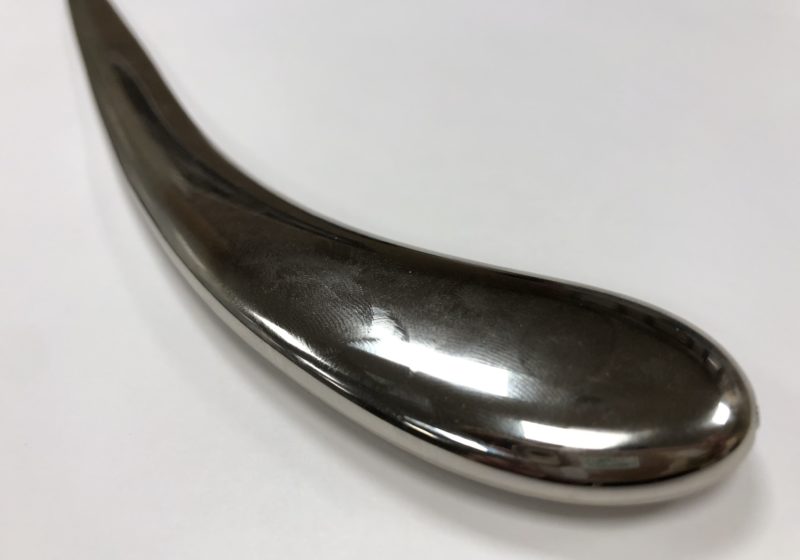The letter openers are about nine inches long, smooth, silvery, shaped a bit like a hockey stick, and if you look into one, you see your stretched-out reflection.
Robert Forster, famous for his work in films like “Jackie Brown,” “Medium Cool,” and “The Descendents” had a closet full of them that he would give to actors, acquaintances, and colleagues.
“I’ve given these letter openers to every actor I’ve worked with for the last 25 years,” he’d tell recipients. He’d follow it up with, “Another satisfied customer!”
UR senior Tess Perry, Forster’s granddaughter, spent two weeks in Los Angeles with him before his death. Even then, she said, he was giving letter openers to nurses.
Forster died at 78 on Oct. 11.
Perry’s mother, her grandmother June Provenzano, and Forster all went to UR. Forster actually met Provenzano at UR.
The story begins with Forster pulling up in his Camaro at UR. Perry recounted how he’d tell it.
“I saw this hot brunette babe walk by in a London Fog raincoat and heels. And she was walking into an audition for ‘Bye Bye Birdie.’ And I had never seen the musical and I had never seen the movie, but I had seen the trailer for the movie. So I followed her in and auditioned because I thought, ‘This is how I’ll meet the girl.’”
A psychology major, Forster had hopes of becoming a lawyer.
He graduated in 1964, and ended up in a Broadway play called “Mrs. Dally” in 1965.
According to a 1968 release from UR’s public relations office, Forster’s career started when he was helping a friend audition for a talent agency. Forster ended up signing with the agent, the release said.
His first film was John Huston’s “Reflections in a Golden Eye,” with Marlon Brando and Elizabeth Taylor. (Forster’s most remembered scene in the film is when he rides on a horse nude.)
According to news coverage from the time, Forster came back to Rochester while waiting for the film’s release, and returned to his old jobs as an iron worker and a substitute teacher. (Specifically, a Times Union article says, he taught special education classes in Public Schools 19 and 21.)
For a while after “Reflections in a Golden Eye,” Forster and his family lived in Penfield, a town near Rochester. Forster would fly to California to conduct his Hollywood business.
“I like Rochester, it’s a nice town,” Forster said in a 1969 Democrat and Chronicle article. “It’s my town. I have friends here. It makes me happy to have family around me and people who are kind of proud of me, I guess it’s the insulation one has against a crazy place like California.”
Forster was born in Rochester to a working-class family. His father, who trained elephants for Ringling Brothers, was gone a lot of the time and his mother worked odd jobs. Forster helped his grandmother run a shop. She lived paycheck to paycheck, Perry said, and helped get him through school. Later, Forster would help his mother get through college.
Forster moved to LA full time in the 1970s, Perry said, but returned to Rochester frequently.
Rochester’s Little Theatre hosted the domestic premiere of the 2018 film “What They Had,” in which Forster played the husband of a woman suffering from Alzheimer’s. Perry said it was both her and Forster’s favorite performance.
Forster’s friend and retired Gannett film critic Jack Garner said first heard of Forster after “Reflections in a Golden Eye,” and followed him as his career took something of a dive after the success of the 1969 film “Medium Cool.”
The two met when Forster came to Rochester to show “Hollywood Harry,” a 1986 film he directed and starred in.Forster’s career was rejuvenated with 1997’s “Jackie Brown.” He played Max Cherry, a mild-mannered, no-nonsense bail bondsman who falls for the titular gun-running heroine.
“I think the film industry and acting in general evolved in such a way that they kind of caught up with him,” Garner said. “There was a period in the earlier years of his acting where some people thought he was a little wooden because he was so restrained.”
Recently, Garner said, Forster’s style has been more appreciated. He died the release day of “El Camino: A Breaking Bad Movie,” in which he reprised his role as Ed from the series’ penultimate episode.
Perry, who would often spend half the year living with her grandfather, said that perseverance was a big part of Forster’s personal philosophy. The two of them used to go on what he would call “tough guy hikes,” Perry said, which were hikes through Runyon Canyon that required using socks as gloves to climb, and butt-sliding down steep sections.
Once, Perry said, they tried bringing her then 10-year-old brother and cousin. They gave up mid-hike, lying down in a pond. Perry said Forster took it as a teachable moment:
“This is a life lesson. Life doesn’t stop. Keep moving.”
The George Eastman Museum, where Forster was a trustee for some time, is honoring Forster by screening “Medium Cool” and “Jackie Brown” at the Dryden Theatre.
Publicity and high-profile tributes have made grieving difficult, Perry said, adding that she is still grateful for all of it.
But a few years ago, Perry said, Forster ensured that she had something to remember him by. A couple hundred things, really, to give to people.
Minutes after leaving her interview, Perry sent an email to the Campus Times, saying there was something she forgot to do.
“It’s really not a big deal,” she wrote. “But it’s a small token that I think my grandpa would want you to have.”
It was delivered in a black box wrapped in brown paper with a green bow. It’s about nine inches long, smooth, silvery, shaped a bit like a hockey stick, and if you look into it, you see your stretched-out reflection.


